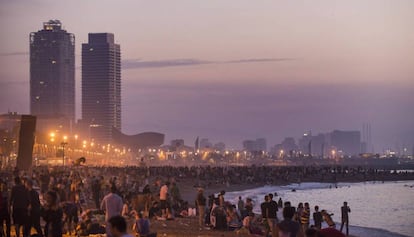Living in Barcelona, working anywhere in the world
Growing numbers of global professionals are being seduced by the quality of life in the Catalan capital

The Swiss architect Gus Wüstemann has lived and worked in Zurich, Mumbai, London, Sydney, New York and Barcelona.“Work is important, but so is your private life, and Barcelona has the highest quality of life in the entire world,” he insists.

Fourteen years ago, Wüstemann moved to the Catalan capital with his family. From Monday to Thursday he works at his studio in Zurich, and the rest of the time he spends in Barcelona, where he also has a studio.
His story is similar to that of a growing number of professionals who are choosing this city as their place of residence, regardless of where they work. To better meet their needs, the city is launching a Welcome Center for international professionals wishing to come live there, explains Jaume Collboni, head of the city’s economic promotion department.
One of the problems that the international community always brings up is poor English skills
There are even training sessions so these professionals’ spouses and partners can familiarize themselves with things like going to a job interview in the city, explains Alicia Egea, head of projects at Barcelona’s municipal employment agency.
Steve Cahill is another professional who loves living in Barcelona. For seven years he was an executive at Colt, a British multinational with more than 35,000 clients in Europe and a customer center in Catalonia. Cahill used to commute between Barcelona and Sitges, overseeing the center and going on business trips when required. When that relationship ended, Cahill stayed in the region to work as an independent entrepreneur with several international projects.
“Perfect combination”
“The quality of life offered by Barcelona is unbeatable. It is a safe city, there is talent, very good infrastructure and communications, a really diverse cultural scene, the food is fantastic, you’ve got the sea and the mountains nearby, and the sun is always shining. It’s the perfect combination,” says Cahill, who also notes that it is easy to make friends here. And the rent, while expensive to Spaniards, still feels affordable to foreigners.

There is only one drawback: “You never find the time to go get some sleep!”
Barcelona Global, an association of Barcelona-based professionals created five years ago, has been following the trend. Director General Mateu Hernández says that foreign members were originally few and far between, but that they now represent 20% of membership. The annual welcome party began with 300 members, and is now up to 1,200.
Poor English skills
Hernández explains that the pioneers of this trend were the expats from large multinationals. They were followed by the science community, then by international entrepreneurs who offer their services worldwide, in turn attracting more foreign talent.
“The last ones to arrive are independent professionals who want to make a living as consultants or board members at multinationals in Switzerland, Britain or France; they live in Barcelona and commute several days a week or for a week out of every month. This pattern will grow, and it is a great opportunity for Barcelona,” he says.
You never find the time to go get some sleep!
Steve Cahill, entrepreneur
And there is a whole new trend: multinational execs who are in charge of a “global” business area with no specific geographical area. There are no hard figures on this trend, “because until now we weren’t on the agenda,” notes Hernández. But informal research has yielded some conclusions.
“We have identified that in terms of paperwork, taxes, and education for international families, Barcelona is not up to their expectations, and we run the risk of losing the opportunity of being a global city,” says Hernández. “Barcelona is attractive to them, but city agencies are not well prepared, and we Barcelona natives are sometimes not sufficiently welcoming.”
One of the problems that the international community always brings up is poor English skills. “English is present at research centers, at business schools, at multinationals, but not in everyday life. And there are few international schools around: there is an elite selection that executives can afford, but not professionals, entrepreneurs or researchers.”
Hernández believes that Barcelona should follow Amsterdam’s example and create English-language schools for the international community.
Jaume Collboni says that the city council “is aware that there is a tough battle going on in the world among the main global cities to attract talent. In the face of a world that is closing in on itself, Barcelona wants to be an open city.”
English version by Susana Urra.
Tu suscripción se está usando en otro dispositivo
¿Quieres añadir otro usuario a tu suscripción?
Si continúas leyendo en este dispositivo, no se podrá leer en el otro.
FlechaTu suscripción se está usando en otro dispositivo y solo puedes acceder a EL PAÍS desde un dispositivo a la vez.
Si quieres compartir tu cuenta, cambia tu suscripción a la modalidad Premium, así podrás añadir otro usuario. Cada uno accederá con su propia cuenta de email, lo que os permitirá personalizar vuestra experiencia en EL PAÍS.
¿Tienes una suscripción de empresa? Accede aquí para contratar más cuentas.
En el caso de no saber quién está usando tu cuenta, te recomendamos cambiar tu contraseña aquí.
Si decides continuar compartiendo tu cuenta, este mensaje se mostrará en tu dispositivo y en el de la otra persona que está usando tu cuenta de forma indefinida, afectando a tu experiencia de lectura. Puedes consultar aquí los términos y condiciones de la suscripción digital.

